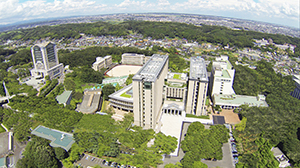- Future Students
- Current Students
- Faculty
- Staff
- Alumni
- Others
UofGH's Dr. Sarah Duni explains how Canada can cut food waste
The Emilia-Romagna region of northeast Italy is world-renowned for its cuisine, having earned a sterling global reputation as one of the world’s foremost destinations for expertly prepared food and wine.
Recently, University of Guelph-Humber instructor Dr. Sarah Duni was invited to deliver a lecture for a visiting group of esteemed government delegates from the food-rich region – which has increased exports to Canada by 14 per cent in the past year – during an Italian Cuisine Week event at Ryerson University.
Addressing an audience that included Toronto’s Italian consulate general Eugenio Sgro, Emilia-Romagna’s regional minister for agriculture Simona Caselli, Coop Italian Food President Roberto Sgavetta, Casa Artusi President Laila Tentoni, and Future Food Institute co-founder Chiara Cecchini, Dr. Duni presented a talk that explored the challenges of food waste in Canada and the similarities and differences between the two countries’ food policies.
Addressing food waste and reducing it helps to achieve Sustainable Development Goals set by the United Nations. It’s an important topic, especially given that the European parliament aims to cut food waste by one half by 2030, while Canada’s National Zero Waste Council Food Loss and Waste Strategy for Canada is seeking to cut food waste in half by 2030.
“Food waste is a huge issue for both Canada and Italy,” Dr. Duni explained. “In Canada, $31 billion worth of food is wasted each year – and 47 per cent of the value of food waste in Canada can be attributed to households.
“In Italy, Dr. Andrea Segrè was the first to provide a quantification of the waste along the food supply chain in Italy. He discovered 20 million tonnes from the field to the point of sale.”
Lessons from Italy’s approach
A major topic of Dr. Duni’s speech concerned Canada’s lack of a national food policy. Italy enacted its own food policy in September 2016, and much can be learned from its approach.
“The Italian law focuses on simplification and incentives,” Dr. Duni said. “This policy’s objective is to examine each stage of the food supply chain from production to consumption and to reduce waste in each stage.
“Italy has taken its legal framework and it has simplified and harmonized it in terms of the fiscal, procedural and health aspects of donating food.”
As one example, Italy clarified several key aspects of the donation process, including (but not limited to) donating food with expired best-before dates (as long as the food is preserved and its packaging is intact). As another example, a label error that is not connected to the sell-by date or the product’s contents no longer excludes the product from donation in Italy. In Canada, meanwhile, there are still issues around donating food with label errors.
“Italy’s national food waste policy really simplified the bureaucratic process,” Dr. Duni said. “Canada has a lot to learn regarding the food supply chain and should look to how Italy has dealt with food waste from production to consumption.”
Taste of Italy
From May 10-20, 2019, Dr. Duni will lead the Study Abroad trip Italy: Food for Thought. The course will explore the excellence of Italian cuisine, with visits to Bologna, Venice, Florence, Pisa and Rome.
It’s an opportunity for UofGH students to not just sample some of the world’s best food, but also to better understand the challenges of creating a sustainable agri-food system at home and abroad.
“The trip is a great opportunity for students to be exposed to the excellence of the Italian agri-food system and make important connections between the Canadian food system,” Dr. Duni said.
“Italy’s a global example of being at the forefront of innovation and sustainability as it relates to food.”







